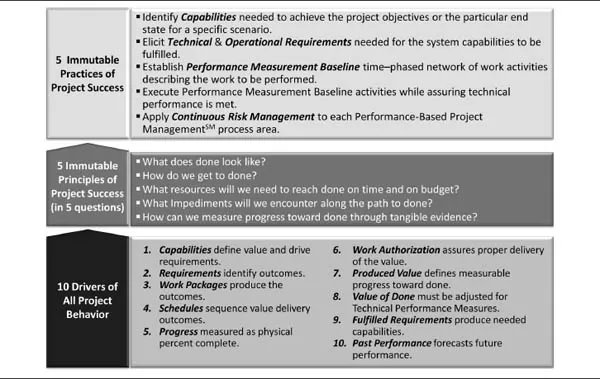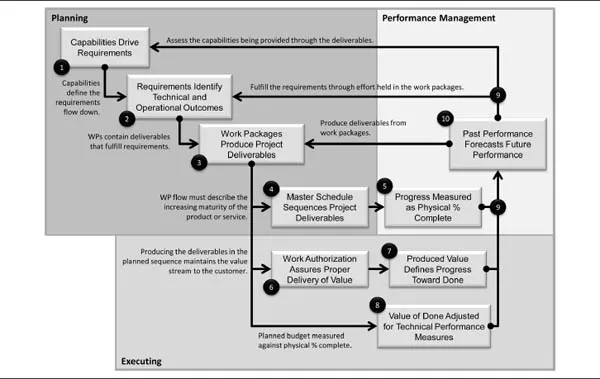
eBook - ePub
Performance-Based Project Management
Increasing the Probablility of Project Success
- 256 pages
- English
- ePUB (mobile friendly)
- Available on iOS & Android
eBook - ePub
About this book
Even the most experienced project managers aren't immune to the more common and destructive reasons for project collapses. Poor time and budget performance, failure to deal with complexity, uncontrolled changes in scope . . . they can catch anyone off guard. Performance-Based Project Management can help radically improve your project's success rate, despite these and other obstacles that will try to take it down. Readers will discover how they can increase the probability of project success, detailing a step-by-step plan for avoiding surprises, forecasting performance, identifying risk, and taking corrective action to keep a project a success. Project leaders wishing to stand out among their peers who are continually hampered by these unexpected failures will learn how to:• Assess the business capabilities needed for a project• Plan and schedule the work• Determine the resources required to complete on time and on budget• Identify and manage risks to success• Measure performance in units meaningful to decision makersBy connecting mission strategy with project execution, this invaluable resource for project managers in every industry will help bring projects to successful, career-enhancing completion.
Tools to learn more effectively

Saving Books

Keyword Search

Annotating Text

Listen to it instead
Information
CHAPTER 1
The Ten Drivers of Project Success
Project success is elusive. Many books, articles, and professional societies suggest methods that can be used to produce this success, and I believe that anything and everything we read, listen to, and participate in around the notion of managing projects can add value to and increase the probability of a project’s success.
Of course, anyone who has been around project management has anecdotes about failed projects and has participated in failed projects despite using the checklists, flowcharts, tools, competency assessments, and certifications designed to improve the chances of producing a successful project. In each of these cases, the project failed because something was missing.
To optimize project success, we need to look to the foundation of all project success, the immutable principles and practices of managing projects.
The Five Immutable Principles of project management success are built on ten success drivers, which are the underlying mechanics of all project work. They are the core processes that take place during the life of any project (see Figure 1.1). The Five Practices used during the management of projects are built on the Five Immutable Principles. The relationship between the principles and the practices is important to the success of any project. Without first establishing the principles, the practices have no foundation on which to “practice.” Figure 1.2 shows how these drivers relate to one another. We’ll look at them in detail later in the chapter. The principles, which are built on the drivers, and the practices, which are built on the principles, are the foundation of project success. This does not mean success is assured, but it does mean that without them the project has less of a chance of success.
The success drivers are organized into three classes:
1. Planning. We need a plan, a schedule, a budget, a description of the work to be performed, and the order in which that work should be performed.
2. Execution. Once the work is defined and the required order established, execution of the work packages (WPs) can take place.
3. Performance Management. While the work is being performed, we need to measure our progress against the plan. This measurement should be tangible, not just an opinion. The best tangible evidence is confirmation that the planned outcome of each work package actually occurred at the planned time for the planned budget.
Figure 1.1 summarizes the principles, practices, and drivers and their functions. As we proceed with this chapter, we will explore each in greater detail.
Project success depends on doing many things right, each of which must operate as a close-knit system, supporting each other in order to deliver a successful project. It all begins with the drivers of the Five Immutable Principles of project management and the Five Practices that implement these principles. They and their relationship to one another are illustrated in Figure 1.2. Without understanding the drivers, there is no real way to check the validity of the principles or practices. These drivers are found in any project, in any business, in any technical domain, using any project management or product development method.
FIGURE 1.1 The foundation of project success starts with the ten drivers.

The Immutable Principles and Practices of Project Success
There is an unspoken question in the project management community: How can we integrate strategic, technical, and managerial processes into a framework based on sound principles, while providing practices that can be applied in a wide variety of domains?
There are numerous approaches to managing projects. Many can be found in books like A Guide to the Project Management Body of Knowledge (PMBOK® Guide), in Prince2®, and in agile software development books. These describe the technical and operational side of project management. The management of cost, schedule, and technical performance can be extracted from these descriptions. Human actions relevant to the management of projects—such as communications, the intent of the leaders, understanding, uncertainty, and the tacit knowledge required to successfully deliver the project’s value to the stakeholders—are also taken into account in these descriptions. A recurring theme in all these methods is that good project management practices need to be built on principles. “Best practices” alone are necessary, but they are not sufficient. Practices, even ones built on sound principles, must be effective in the face of uncertainty, confusion, and ever-present change. With this in mind, we need to search for the drivers that are the foundation of the Five Principles. The Five Practices are then built on these Five Principles. These drivers are the source of both project difficulties and project success. When the driver is absent, the project is missing information needed for success. When the driver is present, it is connected to a principle, which in turn is connected to a practice to increase the probability of success. Without understanding of what “drives” success or failure, the project manager has no insight into how to manage the project to produce success. The project manager is unable to “connect the dots” between what is happening in the project and what should be happening to increase the probability of the project’s success.
FIGURE 1.2 How the ten drivers relate to one another.

Traditionally, a set of project management activities (e.g., product or service integration, cost, communication, scope, quality, risk, time, human resources, and procurement) is applied throughout the management of the project. These activities focus on the execution of the project.
This approach has shortcomings in our quest to increase the probability of project success. For example, the previous list of project activities does not include project strategy, creation of value from the project, measurement of effectiveness of the resulting outcomes, or measures of performance of the work activities in units meaningful to the decision makers.
The Basis of the Five Immutable Principles
Some people in the field talk about the “basic tenets” of project management. But where do these come from? Some say they come from hands-on experience, anecdotal “best practices,” and the good old “school of hard knocks.”
According to Webster’s Dictionary, a principle is a “general truth, a law on which other laws are founded or from which others are derived.” In the project management domain, a principle can be further defined as:1


For the principles of project management to be effective, Max Wideman suggests they must do the following:2

Table of contents
- Cover Page
- Title Page
- Copyright Page
- Contents
- List of Figures
- Acknowledgments
- Introduction
- Chapter 1: The Ten Drivers of Project Success
- Chapter 2: The Five Immutable Principles of Project Success
- Chapter 3: The Five Immutable Practices of Project Success
- Chapter 4: The Five Governing Processes of Project Management
- Chapter 5: Project Management Execution
- Chapter 6: Tailoring the Principles and Practices for Project Success
- Chapter 7: Deliverables Needed for Project Management Success
- Recommended Reading
- Notes
- Index
- About the Author
- Free Sample Chapter from
Frequently asked questions
Yes, you can cancel anytime from the Subscription tab in your account settings on the Perlego website. Your subscription will stay active until the end of your current billing period. Learn how to cancel your subscription
No, books cannot be downloaded as external files, such as PDFs, for use outside of Perlego. However, you can download books within the Perlego app for offline reading on mobile or tablet. Learn how to download books offline
Perlego offers two plans: Essential and Complete
- Essential is ideal for learners and professionals who enjoy exploring a wide range of subjects. Access the Essential Library with 800,000+ trusted titles and best-sellers across business, personal growth, and the humanities. Includes unlimited reading time and Standard Read Aloud voice.
- Complete: Perfect for advanced learners and researchers needing full, unrestricted access. Unlock 1.4M+ books across hundreds of subjects, including academic and specialized titles. The Complete Plan also includes advanced features like Premium Read Aloud and Research Assistant.
We are an online textbook subscription service, where you can get access to an entire online library for less than the price of a single book per month. With over 1 million books across 990+ topics, we’ve got you covered! Learn about our mission
Look out for the read-aloud symbol on your next book to see if you can listen to it. The read-aloud tool reads text aloud for you, highlighting the text as it is being read. You can pause it, speed it up and slow it down. Learn more about Read Aloud
Yes! You can use the Perlego app on both iOS and Android devices to read anytime, anywhere — even offline. Perfect for commutes or when you’re on the go.
Please note we cannot support devices running on iOS 13 and Android 7 or earlier. Learn more about using the app
Please note we cannot support devices running on iOS 13 and Android 7 or earlier. Learn more about using the app
Yes, you can access Performance-Based Project Management by Glen Alleman in PDF and/or ePUB format, as well as other popular books in Business & Human Resource Management. We have over one million books available in our catalogue for you to explore.